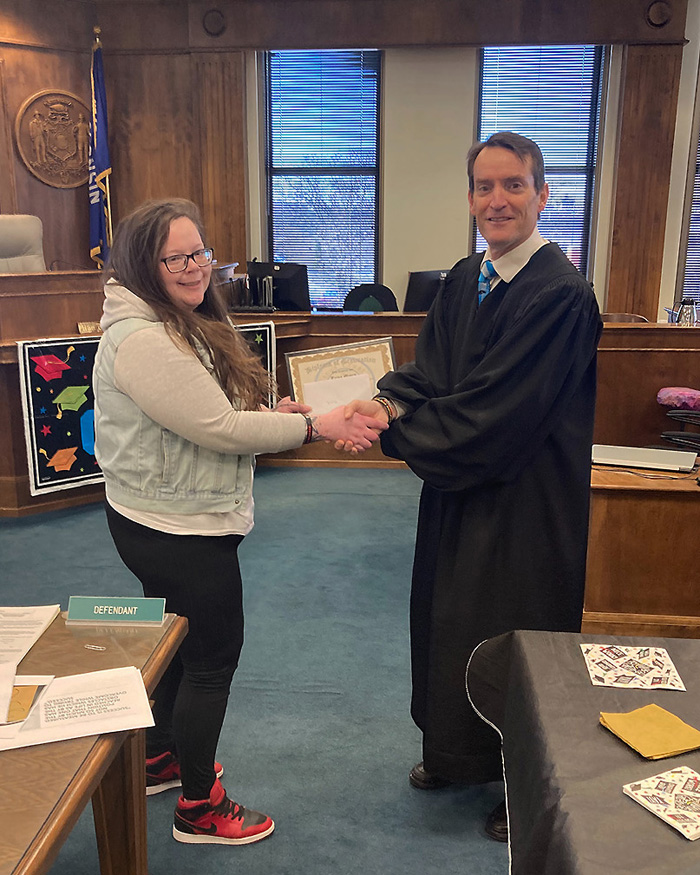
BY RICK COHLER
CONTRIBUTING WRITER
Part IV in Rick Cohler’s series on Brown County Court programs.
BROWN COUNTY – The Brown County Heroin Court program was the first program of its kind in Wisconsin to focus solely on the opioid epidemic.
The program utilizes the Treatment Court Standards and Best Practices to guide program decisions.
Medication-assisted treatment is a big emphasis with this population to help them achieve overall success.
Its basis is set through the Wisconsin HOPE (Heroin, Opiate, Prevention, and Education) agenda, which aims aimed at combating the state’s heroin epidemic.
There were 1,461 opiate overdose deaths in Wisconsin in 2022, including 58 in Brown County, according to Brown County’s’ website.
Those recommended for the treatment court must have been convicted of non-violent offenses.
As with the other Brown County treatment courts, an applicant is put through the Risk and Needs Triage (RANT) tool which yields an immediate and easily understandable report that classifies offenders into one of four risk/needs quadrants, each with different implications for selecting suitable correctional decisions by judges, probation and parole officers and attorneys.
The risk to repeat determines the level of intervention needed.
Participants are required, among other things, to submit to frequent random drug tests, participate in treatment programs and report weekly to court.
Brown County Circuit Court Judge Thomas Walsh is in charge of the heroin court. Walsh noted that there is a significant difference presiding over a treatment court compared to the regular court system which is concerned with guilt, innocence and punishment.
“I can engage with people coming into the justice system in a more meaningful way; by that I mean I can try to help them,” Judge Walsh said. “The county has a lot of resources that people can benefit from if only they knew about them and this court allows us to deliver that assistance.”
One unique aspect of the heroin court is that one of the area’s major medical providers, Prevea, is part of the team.
“That’s unique to this court and that’s important because meaningful because many of the people coming into this court get started on opioids started by a prescription,” Walsh explained. “Rather than focusing on them being part of the problem, we wanted them to be part of the solution.”
Walsh said Prevea has been very helpful and responsive.
Alyson Kelsey is the administrator for the court said seeing those participants who are successful. “I just had an alumni tell me that this saved her life which makes it all worth it,” Kelsey said.
The heroin court has a success rate of 65-70%.
In the other alternative courts, violation of a program requirement often results in spending some time back in jail as a consequence.
The heroin court tries to offer alternatives.
“Eveyone is treated as an individual,” Judge Walsh said. “One of the people who missed court last week is brand new in the program. She had a relapse and we want to be careful that we don’t discourage anybody as soon as they get in the program. On the other hand if you’ve been in the program for some time and you miss court you would be put in jail.”
Participant “Dennis” said without the treatment court he would be still in jail.
“I looked at my options while I was in jail and I have a long history of convictions so getting into heroin court was a blessing. Now I am able to develop a plan,” he said. “People told me having to come to court every week would be a burden but I actually like coming to court; hearing the judge saying good things about me and I’m glad they are there to support me.”
Walsh said if one has been in the judicial system before they are really skeptical about the courts. “Building up trust that this time we are there to help you is hard,” he said.
But for Dennis, he has had success.
“This is my team that’s there to help me, I never had that before,” he said.
